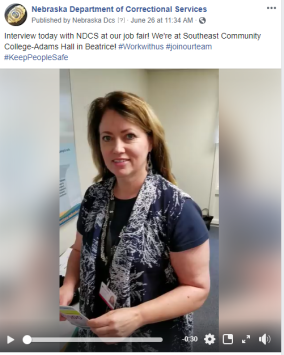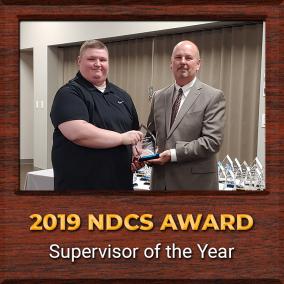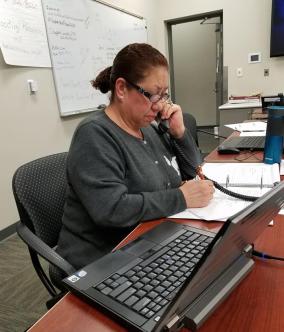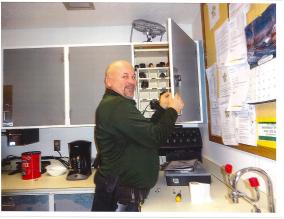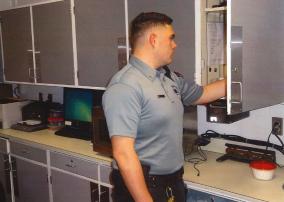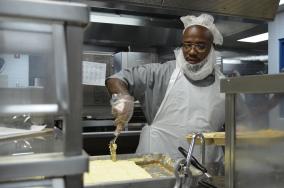|
Dialectic Behavior Therapy (DBT) |
Cognitive-Behavioral Treatment that helps participants develop mindfulness-based coping skills to decrease suicidal and self-harming behaviors.
Needs Addressed: Mental Health
|
Clinical Treatment |
|
Relapse Group |
A support group for people who experience substance abuse relapse until they can enter their recommended level of treatment.
Need addressed: drug/alcohol
|
Clinical Treatment |
|
Continuing Care-Sex Offender Program |
This program helps participants maintain and strengthen the gains they made in other treatment programs. It also helps participants navigate new challenges and helps support the transition back to a community setting.
Needs Addressed: Sex Offender conviction
|
Clinical Treatment |
|
Intensive Outpatient Substance Use Program (IOP) |
Drug and alcohol treatment that is on the treatment continuum beneath residential.
Needs addressed: Substance abuse
|
Clinical Treatment |
|
Choice, Change Consequence |
A domestic violence program focused on developing new thinking in the development of relationships.
Addresses domestic violence referrals
|
Clinical Treatment |
|
Treatment for Substance Use Outpatient (OP) |
Treatment services for individuals who would benefit from some treatment in order to achieve sobriety without needing a higher level of treatment. It is also beneficial for continued support as a step down from residential treatment.
Needs addressed: Drugs and Alcohol Abuse.
|
Clinical Treatment |
|
Restorative Justice Intervention Program |
This program increases a participant's understanding of the harm/damages they caused their victims, communities and themselves. The program also provides an important life skill module that teaches how to become emotionally proficient, which translates into better decision making and reduced conflicts.
Needs Addressed: Attitudes; behavior, Life skills.
|
Non-Clinical Programs |
|
Moral Reconation Therapy (MRT) |
MRT is an evidence-based, cognitive behavioral intervention which leads to enhanced moral reasoning, better decision making and more appropriate behavior.
Needs addressed: Attitudes, behavior.
|
Non-Clinical Programs |
|
Thinking for a Change |
Thinking for a Change is a high-level cognitive behavioral program developed by the National Institute of Corrections. The program uses role playing to concentrate on changing the criminogenic thinking of offenders.
Needs addressed: Attitudes; behavior; family; friends; aggression.
|
Non-Clinical Programs |
|
7 Habits on the Inside |
Developed by FranklinCovey in cooperation with the Colorado Department of Corrections, 7 Habits on the Inside uses the principles of the 7 Habits of Highly Effective People, tailored for the incarcerated individual. The program seeks to empower individuals to manage their own lives in such a way as to be successful in prison and in the community and using the principles of integrity, proactivity, and other key skills. (12 weeks)
Needs Addressed: Attitudes/Behavior; Family; Employment; Life Skills
|
Non-Clinical Programs |
|
Alternatives to Violence Project (AVP) |
The Alternatives to Violence Project (AVP) is a workshop that provides insight on anger and relationships; and new ways to address disagreements.
Needs Addressed: Attitudes, behavior, family, friends, employment
|
Non-Clinical Programs |
|
Metro Community College (MCC) Core Courses (Credit) |
Completion of any 3 college credit courses.
Need addressed: Education/Employment/outside interest
|
Education Programs |
|
Adult Secondary Education (ASE) |
Assists students prepare for taking the high school equivalency test (GED).
Addresses Need Area: Education
|
Education Programs |
|
College correspondence |
Opportunity to pursue college coursework through individual and family support.
Need addressed: Education, employment.
|
Education Programs |
|
ESL/ELL |
English as a second language (ESL) provides individuals with literacy support before Adult Basic Education
Needs addressed: Education; life skills
|
Education Programs |
|
Adult Basic Education |
Builds basic skills for GED testing, college readiness and/or skill development.
Need Addressed: Education
|
Education Programs |
|
High School Diploma |
NDCS operates its own school district with a high school. Students of all ages may attend high school classes. Individuals under 22 who have not graduated from high school are required to be in school. Students over 22 need to go through an application process.
Need addressed: Education.
|
Education Programs |
|
Narcotics Anonymous |
Narcotics Anonymous encourages its members to attend meetings, read and listen to speakers to face the truth and be accountable for their addictions.
Need addressed: Drug addiction support; pro-social/outside interest.
|
Pro-Social Activities |
|
Sports/Recreation Activities |
A variety of activities that encourage health pastimes are offered at all facilities. Please check with recreational specialists for more information.
Needs addressed: Pro-social/outside interest; health.
|
Pro-Social Activities |
|
Restorative Circle |
A support group for incarcerated individuals working on restorative justice.
Needs addressed: Support; pro-social/outside interest.
|
Pro-Social Activities |
|
Habitat For Humanity |
Volunteer work in the community building homes for families in need.
Need addressed: Pro-social activity
|
Pro-Social Activities |
|
Discharge Planning |
Reentry specialists work with individuals to ensure a reentry plan is completed. The plan allows for a smooth transition to the community and focuses on housing, transportation, employment, education, and medical/mental health services as needed.
Need addressed: Re-entry
|
Reentry Services |
|
Assistance for Social Security Application |
Social workers provide assistance in obtaining and completing Social Security applications to individuals who qualify and are 90 days from discharge, post-release supervision or parole.
Need addressed: Re-entry for those who may qualify for Social Security benefits due to age or disability.
|
Reentry Services |
|
Reentry planning |
Clients develop comprehensive reentry plans that include housing/transitional living, employment/education, transportation, ID credentials, medical/mental and behavioral health treatment.
Need addressed: Reentry.
|
Reentry Services |
|
Sex Offender Registration Act (SORA) |
Designed to increase knowledge of sex offender registration laws, how to avoid registration violations and prepare for release with registration laws in mind.
Need addressed: reentry
|
Reentry Services |
|
Crisis Intervention |
Provided on an as-needed basis, clinicians are available to assist individuals in a mental health crisis.
Needs Addressed: Mental health.
|
|
|
Individual/Group Psychotherapy |
Licensed, clinical therapists provide one-on-one or group therapy sessions as needed.
Need addressed: mental health
|
|
|
Risk Assessment/ Psychological Evaluations |
Risk Assessments and Psychological Evaluations provide diagnosis clarification, intelligence testing and Dementia screening.
Need addressed: Mental Health; education.
|
|
|
Transition Services |
Transition Services are available to those transitioning to or from general population or protective management. Mental Health professionals may assists with these services.
Need Addressed: Mental Health
|
|
|
Skilled Nursing Facility |
On-call Skilled Nursing Facilities manage crises dealing with medical emergencies, behavioral issues and suicide watches.
Needs addressed: Health and mental health.
|
|
|
Clinical Treatment Programs |
See clinical programs list for more details.
|
|
|
Specialized Population Served |
Specialized Population Served offers services for inmates with mental illness or serious chronic medical conditions that are high risk and multi-needs.
Needs addressed: Health; mental health
|
Social Work Services |
|
Medical Services Coordination |
Social workers assist individuals with high medical needs to set appointments for medication management, healthcare and provide resources to obtain medical insurance upon release:
Needs addressed: Health, mental health, life skills, re-entry.
|
Social Work Services |
|
Specialized Housing Services |
Social workers provide assistance to individuals with high medical/mental health needs to obtain transitional living, assisted living or skilled nursing care, as needed.
Needs addressed: Re-entry
|
Social Work Services |
|
Community Coordination |
Social workers coordinate with a variety of community providers and agencies for mental health services, substance abuse treatment and medical services. Providers include the Veteran's Administration, DHHS, treatment agencies, private practice and non-profit organizations.
Needs Addressed: Housing, medical, mental health, basic needs, re-entry.
|
Social Work Services |
|
Living Needs |
Social workers assist individuals with high medical/mental health needs to find clothing resources, apply for benefits or general assistance and other life needs.
Needs addressed: Social work services.
|
Social Work Services |
|
Department of Labor Workforce Development |
Helps participants develop a resume, prepare for interviews and work on job skills.
Need area addressed: Employment
|
Vocational/Life Skills Programs |
|
Career Readiness |
Helps individuals identify a specific career path; learn professional and personal skills to assist them in getting a job.
Need addressed: Employment
|
Vocational/Life Skills Programs |
|
Metro Community College (MCC)-ACT National Career Readiness |
Measures/certifies skills needed for job success. Used by employers, educators and others to provide evidence that job seekers have the skills employers are looking for.
Need addressed: Vocational Life skills
|
Vocational/Life Skills Programs |
|
Computer based Education and Training |
Certificate program utilizing tablets for improvement in academics and job training.
Need addressed: Education. employment
|
Vocational/Life Skills Programs |
|
Metro Community College (MCC) 180 Outreach Support |
Assists individuals with education, training, workforce and transition support.
Need addressed: education and employment support
|
Vocational/Life Skills Programs |
|
Metro Community College (MCC) Orientation/Initial Communication |
Teaches and discusses career planning, program determination, scholarship information, registering for classes/training, financial aid/funding information, conducting assessments, creation of educational plans, and assists students with community resources referrals.
Needs addressed: Education, employment
|
Vocational/Life Skills Programs |
|
ABC Construction: OSHA Construction |
This program provides an overview of safety applications on a construction site as well as training on governmental regulations.
Need Addressed: Employment
|
Vocational/Life Skills Programs |
|
Reconnect Right Start |
A two week job readiness and career assessment class. Participants will learn the imporatnce of career assessments in employment success.
Need addressed: employment
|
Vocational/Life Skills Programs |
|
RISE Reentry Support |
Provides case management to RISE graduates at the facility including job support, housing support, reentry support.
Needs addressed: Reentry,
|
Vocational/Life Skills Programs |
|
Health Course |
This program, delivered by a wellness expert, provides workshops on preventative health education and nutrition, such as Men's Birth Control; Date Abuse; Bullying; Gender Boxes; and Hygiene.
Need addressed: Health.
|
Vocational/Life Skills Programs |

